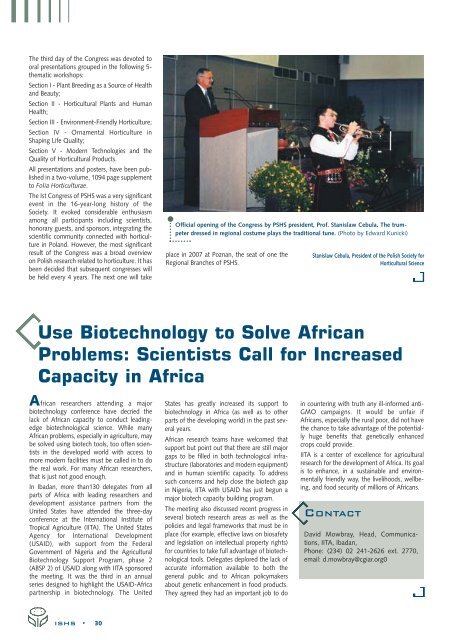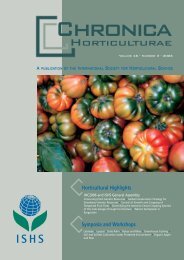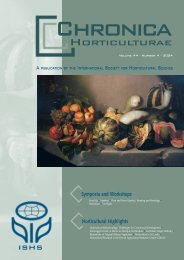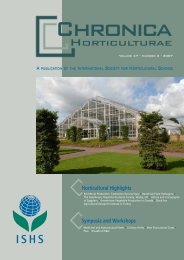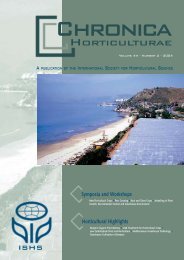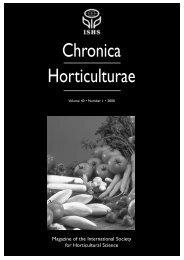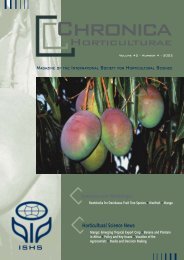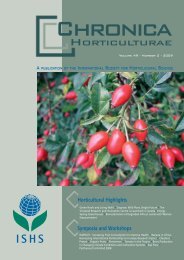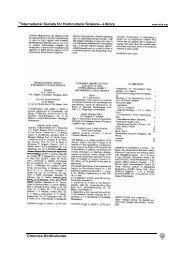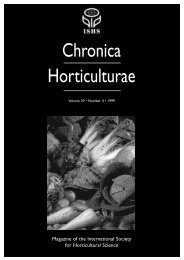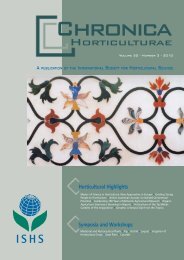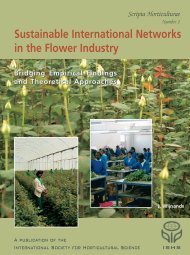Acta Horticulturae
Acta Horticulturae
Acta Horticulturae
Create successful ePaper yourself
Turn your PDF publications into a flip-book with our unique Google optimized e-Paper software.
The third day of the Congress was devoted to<br />
oral presentations grouped in the following 5-<br />
thematic workshops:<br />
Section I - Plant Breeding as a Source of Health<br />
and Beauty;<br />
Section II - Horticultural Plants and Human<br />
Health;<br />
Section III - Environment-Friendly Horticulture;<br />
Section IV - Ornamental Horticulture in<br />
Shaping Life Quality;<br />
Section V - Modern Technologies and the<br />
Quality of Horticultural Products.<br />
All presentations and posters, have been published<br />
in a two-volume, 1094 page supplement<br />
to Folia <strong>Horticulturae</strong>.<br />
The Ist Congress of PSHS was a very significant<br />
event in the 16-year-long history of the<br />
Society. It evoked considerable enthusiasm<br />
among all participants including scientists,<br />
honorary guests, and sponsors, integrating the<br />
scientific community connected with horticulture<br />
in Poland. However, the most significant<br />
result of the Congress was a broad overview<br />
on Polish research related to horticulture. It has<br />
been decided that subsequent congresses will<br />
be held every 4 years. The next one will take<br />
Official opening of the Congress by PSHS president, Prof. Stanislaw Cebula. The trumpeter<br />
dressed in regional costume plays the traditional tune. (Photo by Edward Kunicki)<br />
place in 2007 at Poznan, the seat of one the<br />
Regional Branches of PSHS.<br />
Stanislaw Cebula, President of the Polish Society for<br />
Horticultural Science<br />
Use Biotechnology to Solve African<br />
Problems: Scientists Call for Increased<br />
Capacity in Africa<br />
African researchers attending a major<br />
biotechnology conference have decried the<br />
lack of African capacity to conduct leadingedge<br />
biotechnological science. While many<br />
African problems, especially in agriculture, may<br />
be solved using biotech tools, too often scientists<br />
in the developed world with access to<br />
more modern facilities must be called in to do<br />
the real work. For many African researchers,<br />
that is just not good enough.<br />
In Ibadan, more than130 delegates from all<br />
parts of Africa with leading researchers and<br />
development assistance partners from the<br />
United States have attended the three-day<br />
conference at the International Institute of<br />
Tropical Agriculture (IITA). The United States<br />
Agency for International Development<br />
(USAID), with support from the Federal<br />
Government of Nigeria and the Agricultural<br />
Biotechnology Support Program, phase 2<br />
(ABSP 2) of USAID along with IITA sponsored<br />
the meeting. It was the third in an annual<br />
series designed to highlight the USAID-Africa<br />
partnership in biotechnology. The United<br />
States has greatly increased its support to<br />
biotechnology in Africa (as well as to other<br />
parts of the developing world) in the past several<br />
years.<br />
African research teams have welcomed that<br />
support but point out that there are still major<br />
gaps to be filled in both technological infrastructure<br />
(laboratories and modern equipment)<br />
and in human scientific capacity. To address<br />
such concerns and help close the biotech gap<br />
in Nigeria, IITA with USAID has just begun a<br />
major biotech capacity building program.<br />
The meeting also discussed recent progress in<br />
several biotech research areas as well as the<br />
policies and legal frameworks that must be in<br />
place (for example, effective laws on biosafety<br />
and legislation on intellectual property rights)<br />
for countries to take full advantage of biotechnological<br />
tools. Delegates deplored the lack of<br />
accurate information available to both the<br />
general public and to African policymakers<br />
about genetic enhancement in food products.<br />
They agreed they had an important job to do<br />
in countering with truth any ill-informed anti-<br />
GMO campaigns. It would be unfair if<br />
Africans, especially the rural poor, did not have<br />
the chance to take advantage of the potentially<br />
huge benefits that genetically enhanced<br />
crops could provide.<br />
IITA is a center of excellence for agricultural<br />
research for the development of Africa. Its goal<br />
is to enhance, in a sustainable and environmentally<br />
friendly way, the livelihoods, wellbeing,<br />
and food security of millions of Africans.<br />
CONTACT<br />
David Mowbray, Head, Communications,<br />
IITA, Ibadan,<br />
Phone: (234) 02 241-2626 ext. 2770,<br />
email: d.mowbray@cgiar.org0<br />
ISHS • 30


